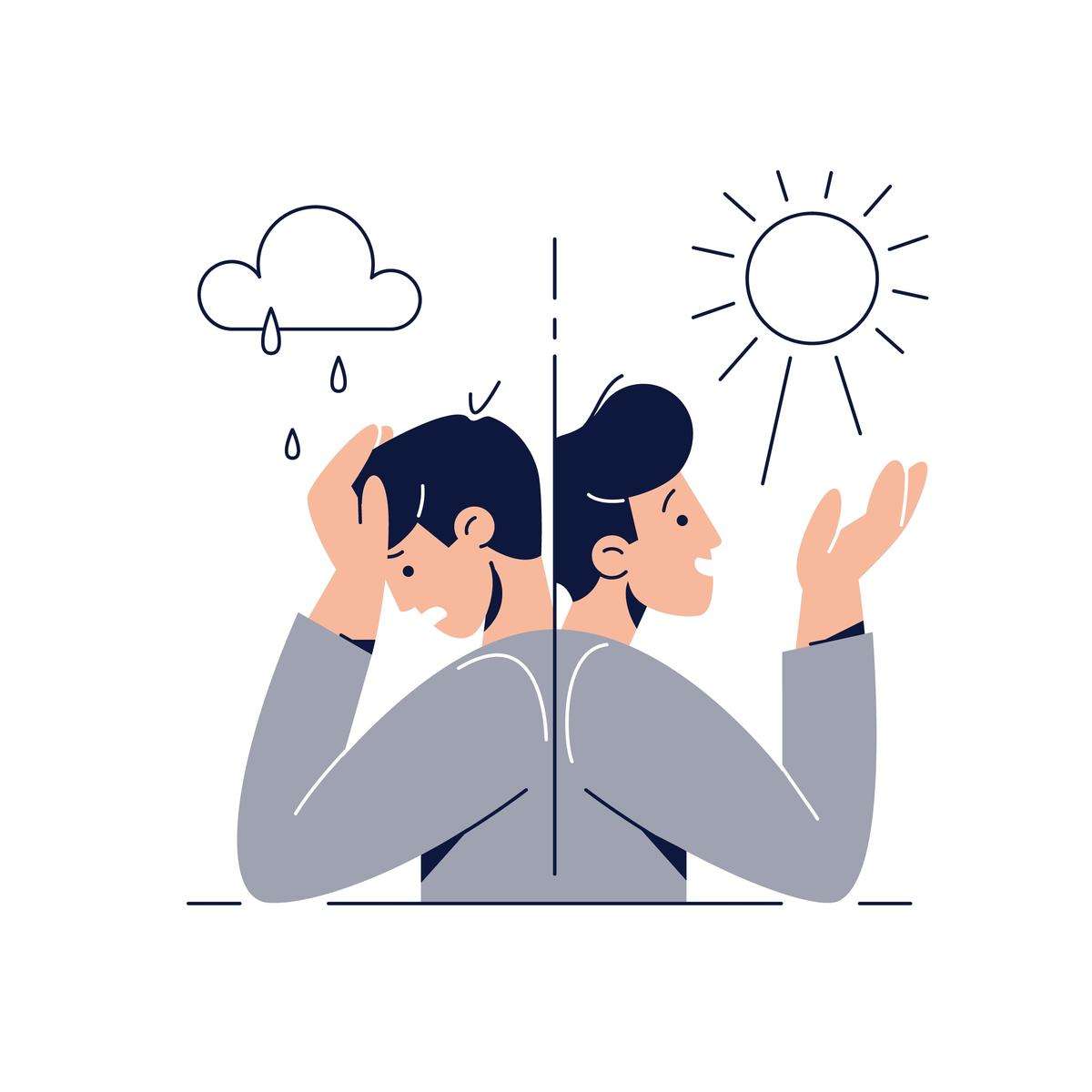Physical symptoms of bipolar disorder in Men
by adm_enq · July 7, 2023

Read the entire post to have a thorough understanding of bipolar disorder in men. As more people learn about bipolar disorder, it becomes clear that it affects many lives. At one point, more and more people seemed to understand that manic depression is a serious illness that must be treated if the person with it wants to live a normal life.
Many studies have been done to find out the real link between bipolar disorder and quality of life, and they all agree that people with bipolar disorder have a much lower quality of life. The data showed that men are more likely to be given the wrong diagnosis and, even worse, are less likely to have the disorder or be diagnosed with it. Therefore, it is essential to understand that the symptoms of bipolar disorder in men and women differ
In general, mental health problems don’t care about the gender of the person who has them. Many national health institutes have found that people with bipolar disorder have big changes in their moods and energy levels, making it hard to do daily chores. Men are more likely to get bipolar illness than women, both when they are young and older. Because the disease has such a strong effect on emotional and mental states, it seems that gender plays a role in how it affects a person.
What is bipolar disorder?
Bipolar disease is a mental illness that usually makes a person’s mood, energy level, and level of activity change a lot.
People with bipolar disorder have “mood episodes,” when they feel sad or angry. This may last for days, weeks, or even months. Even though mood changes can happen to almost anyone, the ones that come with bipolar disorder are different in how bad they are and how much they affect daily life.
There are three primary kinds of mood episodes associated with bipolar disorder:
Manic episodes:
During manic episodes, individuals experience elevated mood swings, increased energy levels, racing thoughts, a reduced need for sleep, and difficulty concentrating and staying focused.
Depressive episodes:
Sadness, hopelessness, loss of interest in or enjoyment from activities, exhaustion, changes in appetite or weight, trouble sleeping or oversleeping, guilt or a sense of worthlessness, difficulty concentrating, and suicidal thoughts are all symptoms of depressive episodes.
Hypomanic episodes:
Hypomanic episodes are like panic attacks, but not as bad.
People with bipolar disorder can have mood episodes in different ways and at different times. Some people may have episodes that are more severe and happen more often, while others may have long periods of stable mood between episodes. The disorder can greatly affect a person’s personal relationships, performance at work or school, and quality of life in general
People think a mix of genetic, biological, and emotional factors causes bipolar illness. It is usually identified after carefully examining the symptoms, medical history, and other factors. Bipolar disease is often treated with a mix of medications, psychotherapy, coping skills development, and lifestyle changes.

Signs of bipolar disorder in men:
Men and women who have bipolar illness show signs and symptoms that are very different from each other. It’s important to talk about and understand them because the signs of bipolar disorder in men are often linked to why identification and treatment are often put off. As with most mental health problems, getting care and help early is the best way to know if you can handle bipolar disease well.
Men are much more likely to have severe manic episodes or manic symptoms like extreme highs, a lot of energy they can’t explain, and feeling like they don’t need or want to sleep. This is different for women because women with bipolar disease are much more likely to have episodes of depression. During one episode, a man’s mania or manic phase can last anywhere from a few days to a few months.]
During a manic attack, you might not be aware of what is going on around you. Men are also more likely to get very angry during a manic episode.
-Extremely happy
-Thoughts that race
-Constant talking
-Easily irritated
-Extremely irritable
-Having bad judgment
-Displaying rash and violent behaviour
Bipolar depression symptoms in men:
Men with bipolar disorder are more likely to get angry and irritable when they have a depressive episode or depressive symptoms than women. Antidepressants don’t help most people with bipolar depression. There is a chance that antidepressants can make bipolar disease worse by causing mania or hypomania. Even though bipolar depression and normal sadness have a lot in common, some symptoms are more common in bipolar depression.
Thus, a diagnosis of bipolar depression might not be as timely or appropriate as it should be.
-
- The feeling of hopelessness and sadness
-
- Eating not enough or too much
-
- Feeling of loneliness
-
- Concentration difficulties
-
- Sleeping too much
-
- Substance abuse
-
- Suicidal thoughts
It’s important to remember that these signs don’t only show up in guys with bipolar disorder. The disorder can show up in different ways for different people. It is important to get help from professionals in mental health to get the correct diagnosis and care.
Surprising physical symptoms of bipolar disorder in men:
Bipolar disease mostly affects a person’s mood and behavior, but it can also cause physical symptoms. Even though these physical signs are more common in guys, they can happen to anyone. Here are some examples.
Sleep disturbances:
Both mania and depression can make it hard to sleep when you have bipolar disorder. During manic episodes, guys may not need to sleep as much and can do things all night without getting tired. On the other hand, when depressed, they may have trouble sleeping or sleep too much, making it hard for them to fall or stay asleep.
Weight and appetite changes:
Bipolar disorder can influence an individual’s appetite and weight. Due to elevated energy levels, men experience a decreased appetite and unintentional weight loss during manic episodes.
Fatigue or low energy:
Bipolar disease is most often linked to changes in mood, but it can also cause physical tiredness and low energy levels. During depressive episodes, a person may feel overly tired and lack the desire to do daily and physical activities.
Headaches or bodily pain:
Some individuals with bipolar disorder, including men, may experience headaches, migraines, or unexplained bodily pains.
Digestive issues:
Bipolar disorder has been associated with gastrointestinal problems such as irritable bowel syndrome and other digestive disorders. It’s unclear why this link exists, but research shows it may have something to do with the effects of stress, changes in gut microbiota, or problems with the brain-gut axis.
How is bipolar disorder treated?
Many people, even those with the worst forms of bipolar illness, can get better with treatment. Most of the time, a good treatment plan includes a mix of the following therapies:
Psychotherapy:
Psychotherapy, also called talk therapy, can be an effective part of the treatment plan for people with bipolar disorder. Psychotherapy is a term for a range of treatments that aim to help you figure out and change feelings, thoughts, and behaviors that are bothering you.

Medications:
Certain medications can help manage the symptoms of bipolar disorder. You may need to try different medications with guidance from a healthcare provider before finding what works best.
Medications that healthcare providers generally prescribe to treat bipolar disorder include:
-
- Mood stabilizers
- Antipsychotics
- Antidepressants
Aside from this, physicians may occasionally prescribe modafinil off-label to treat bipolar disorder. Although it is not FDA-approved as a primary treatment for bipolar disorder. While modafinil’s potential use in bipolar depression has been investigated, the evidence supporting its efficacy is limited and contradictory. Consult a healthcare professional who can provide an accurate diagnosis and formulate an appropriate treatment plan.
Conclusion:
Patience and the proper treatment strategy are essential for managing bipolar disorder. This entails collaborating with healthcare experts and following their recommendations. Patients should follow professional advice, take prescribed medications, and be honest with their medical team about symptoms and changes.
These measures provide the appropriate support for managing bipolar disorder. Bipolar disorder can affect men earlier than it does women. Bipolar disorder is a condition that may be treated, despite its varied outward manifestations. Anyone who believes they frequently exhibit symptoms of this disorder should seek help and advice from a healthcare provider.
FAQ'S
Even though no one knows what causes bipolar disorder, it is thought that genes, a history of bipolar disorder in the family, stressful life events, and chemical changes in the brain all play a role.
The mood swings, impulsivity, and trouble communicating that come with a bipolar illness can strain relationships. To deal with how it affects relationships and family life well, you need to understand, support, and talk about it.
Usually, treatment includes a mix of medication (like mood stabilizers) and therapy (like cognitive-behavioral therapy). It changes your lifestyle (like learning to deal with stress and keeping a regular sleep routine).











